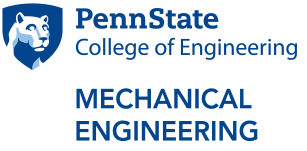
Career, Degree Planning Resources
- Co-ops and Internships
- International Student Career Resources
- Minors
- Concurrent Majors
- Sequential Degrees
- Petitions and Course Substitutions
- Grade Forgiveness Policy
Co-ops and Internships
The Mechanical Engineering Department strongly encourages students to participate in the co-op and internship program. This is an excellent opportunity for students to gain hands on experience prior to graduation.
The co-op program is an alternating work-study program where students work with a company for three semesters. Students can choose to complete a rotation during the fall, spring or summer semester. This program enables students to graduate with industrial experience, and as a result, graduation is usually extended to accommodate the work experience. In addition, graduates of the co-op program are often offered a higher starting salary. An internship is a short-term work experience for a company, typically lasting 12 to 15 weeks over the summer. Although internships can also occur during the fall or spring semester as well.
Students must register for 1 credit (ENGR 195, 295, 395, 495) for the first, second, or third work rotation. By enrolling in one of these co-op courses, students will maintain their “full time” student status with the university. This allows students to continue through the semester as if they were enrolled as a full-time student. For each work rotation, a student can earn one credit. If the student accumulates three co-op or internship credits, the credits can be used to satisfy the General Technical Elective (GTE).
The co-op and internship program is managed by the Engineering Career Resources & Employer Relations Office located in 117 Hammond Building. Interested students can obtain information about the program by visiting the Engineering Career Resources & Employer Relations website.
International Student Career Resources
If you are an international undergraduate or graduate student in the College of Engineering, congratulations! You have taken a courageous step by leaving the comfort and familiarity of your home country to study at Penn State. International students enhance domestic students' university experience by bringing new and diverse perspectives and experiences.
Take advantage of all available opportunities to set yourself up for success in your engineering career, whether you ultimately settle here in the United States, in your home country, or elsewhere in the world
For more information, please visit the Engineering Career Resources & Employer Relations website.
Minors
A minor consists of at least 18 credits that supplement a major. For the ME degree, required courses and technical electives can often be used to satisfy some requirements for a minor within Engineering. If carefully planned, some of these minors can be completed with only a few additional credits. Review details to see what required courses in the BSME program can be used to fulfill requirements for a minor.
Minors can also be obtained in other programs in other colleges. See the online Undergraduate Degree Programs Bulletin, in the section describing programs within colleges which gives the content, standards of admission and graduation, and other details about specific minors in specific departments.
Concurrent Majors
A student who receives approval from the respective colleges may gain entrance to more than one major. The student successfully completing the requirements for multiple majors shall receive a separate diploma for each major for which requirements have been completed. The final academic record will indicate the completion of the requirements for each major.
Discussed below are several common concurrent majors. Program Requirements and Flow Charts for each of these Concurrent Majors are also included at the end of the section.
Concurrent Majors in Biomedical Engineering and Mechanical Engineering
With department permission, a student may pursue concurrent majors in both Biomedical Engineering and Mechanical Engineering. Students receiving a concurrent major in BME and ME will receive a BS degree and diploma in both disciplines and is expected to have enhanced employment opportunities in the Biomedical Engineering and Mechanical Engineering industry, where there is overlap between the two disciplines. Students interested in the BME/ME concurrent majors must first be admitted into ME, and then add BME as a second major. Prospective students are encouraged to plan their entry to Biomedical Engineering in their first year since the second-year life science courses are not part of the common engineering curriculum. Further information about the concurrent majors program in BME and ME, can be found here.
Apply for the Concurrent Majors in Biomedical Engineering and Mechanical Engineering on LionPath.
Concurrent Degrees Program in Liberal Arts and Engineering
The Concurrent Degrees Program in Liberal Arts and Engineering requires 10 semesters of study. During the first six (6) semesters 70 credits of General Education and Bachelor of Arts degree requirements are completed in addition to 30-34 credits of basic Engineering requirements. During the final 4 semesters, 12 Liberal Arts credits are completed as well as the remaining requirements for the selected College of Engineering major.
Upon completion of the program, the degree of Bachelor of Arts in General Arts and Sciences will be awarded by the College of the Liberal Arts and the Bachelor of Science by the College of Engineering. To be eligible, the student must file an application for entrance with the Assistant Dean for Student Services, College of Engineering, by the published deadline during the student’s 3rd semester and with the Associate Dean for Undergraduate Studies, the College of the Liberal Arts. You can email the Assistant Dean for Student Services Office at enugrecords@engr.psu.edu for additional information.
Sequential Degree (Senate Policy 60-20)
A PSU student who has graduated from Mechanical Engineering desiring a second BS degree must request enrollment. Students must complete their first BS degree before applying for a second BS degree. Due to restrictions in engineering enrollments, preference is granted to students pursuing their first engineering degree and there is a low probability of being able to pursue a second BS degree in engineering. Restrictions may apply to admission to a major that is under enrollment control. (See Policy 60-20 for more details.)
Petitions and Course Substitutions
The standard curriculum for each major is given in the online Baccalaureate Degree Programs Bulletin. Substitutions for the required courses may be permitted when the subject matter is equivalent in content, level, and credits. The evaluation of work done at other institutions or in other programs is made by the department when the student enters Mechanical Engineering and substitutions are evaluated at that time. Students enrolled in the program must request substitutions on a standard petition form BEFORE the substitute courses are taken. The petition must be approved by the Adviser, the Professor-In-Charge of Undergraduate Programs, and/or the Associate Dean. Petitions from students wishing to graduate must be submitted prior to their graduating semester. College petitions will not be considered from students wishing to graduate once their graduating semester begins. Petition forms can be submitted through a link found here: Engineering Petition Submission Procedures and Link.
Please talk with your advisor if you have questions about using the transfer credit tool located here—Transferring Credit to Penn State from other Colleges as a Transfer Student—or if you are considering transferring in credits from another university/college during the semester you intend to graduate, as this will most likely delay your graduation.
If the course in question appears here, it may transfer with a Penn State course number or may transfer as general credits. If the course transfers as general credits, an online e-petition can be filed through the college of engineering. This petition will request to use general credits towards degree requirements. If the course does not appear in the transfer course list, the student must print a “Transfer Course Evaluation Form” and submit it along with the course description to the University Admissions Office, 201 Shields. Admissions will evaluate the course, returning the evaluation to the student, who in turn should take a copy to the department undergraduate programs office. If the course in question is to fulfill a major requirement it will also need to be approved by the Professor-in-Charge of ME Undergraduate Programs. Do not assume that any course will be accepted until these forms have been completed and approved.
There are two types of petitions students may wish to use:
Department Petitions: If a student seeks permission to waive any Department or College requirement described in this manual, i.e., substitution of required courses with other courses or transfer courses; or use a course for AHS or US/IL requirement, or use of Technical Electives other than any 400-level engineering course; they must apply formally on a petition application that can be submitted through: https://coursesub.psu.edu/. The purpose of the petition is to document the issue for the student's records:
Senate Petitions: Requests to waive any of the University procedures described in the "Policies and Rules for Students" require students to petition the University Senate for approval. The most common circumstances are: dropping or adding a course retroactively; withdrawing from the University retroactively; late registration
The Senate petition requires the student to submit a petition in the form of a personal letter and supporting documents addressed to the Senate Committee on Undergraduate Education. For specific information on submitting this type of petition, visit the University's Faculty Senate Student Petitions webpage.
IMPORTANT INFORMATION FOR STUDENTS: Students, please DO NOT send petition materials directly to the Faculty Senate office. It will cause a delay in the process. Students initiate a petition by speaking with an adviser at their college/campus advising center and provide all petition documents to them.
Grade Forgiveness Policy
Beginning with the summer 2020 semester, Penn State is implementing a new grade forgiveness option for undergraduate students. Under this new policy, if a student earns a D or F grade in a course but then repeats the course and earns a better grade, the original grade can be forgiven. If a grade forgiveness request is approved, the original course still will appear on the student's official transcript, but will not earn credit or count towards the student's term or cumulative GPA.
How to Submit a Grade Forgiveness Request
Before submitting a request for grade forgiveness, please read the H-2 Undergraduate Grade Forgiveness procedure, which includes the complete policy and procedure regarding grade forgiveness, as well as the Grade Forgiveness Request form that students will complete with consultation from their academic adviser. Students should submit the completed form to their academic adviser.
When academic advisers receive a completed Grade Forgiveness Request form, they will submit the form and student information to the designated college representative within the student's college of enrollment. The college representative will confirm if the student request for grade forgiveness meets the eligibility criteria as defined by the H-2 Undergraduate Grade Forgiveness procedure.




